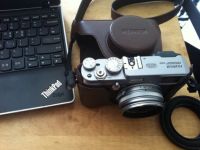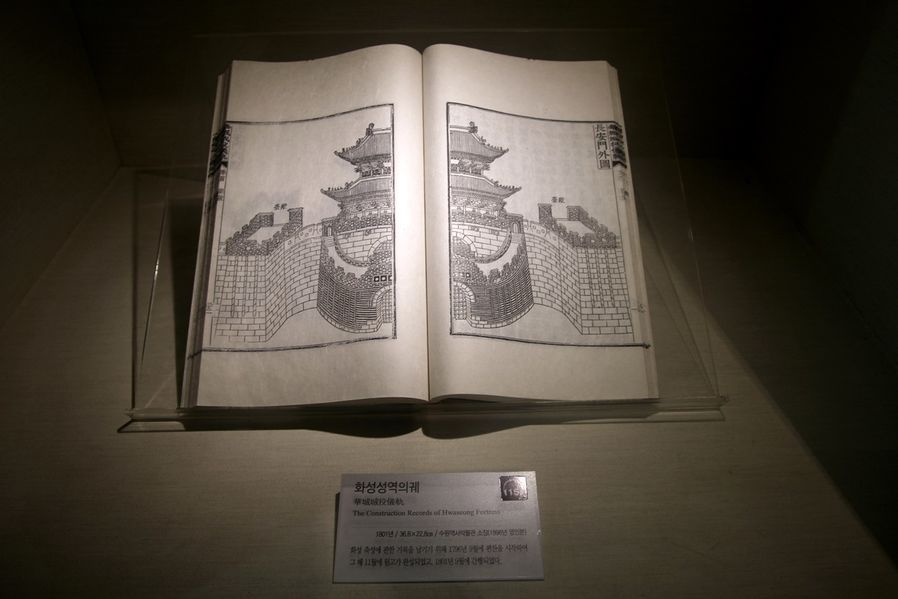-
Start
-
Gwanggyo Reservoir
-
Hwaseong
-
Hwaseong Haenggung
-
Janganmun
-
Suwon Chicken Alley
-
Haegungdong
-
Paldalmun
-
Finish
How Was Suwon Hwaseong Fortress Built? Suwon Hwaseong Museum 수원화성박물관
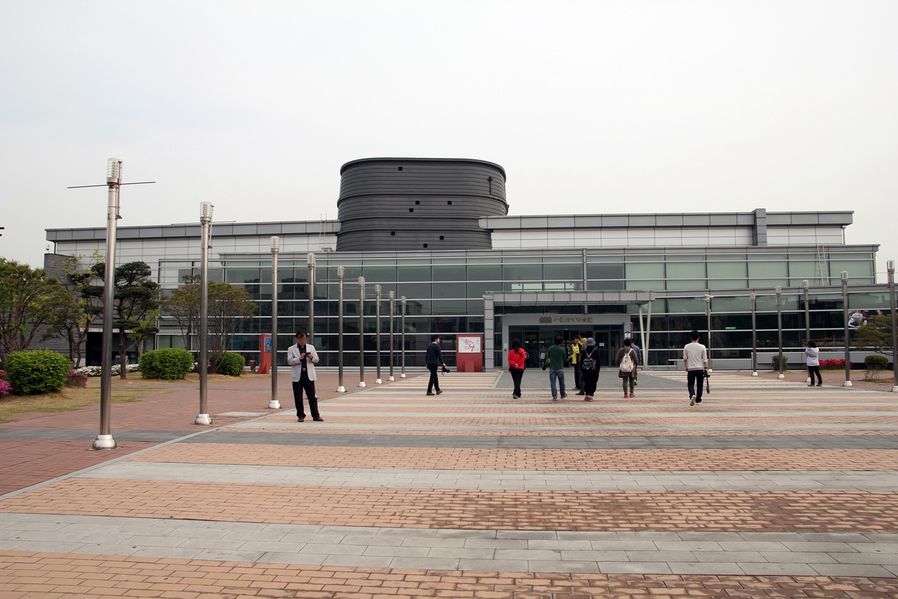
It's closed on every Monday so keep that in mind. I normally go somewhere on Monday so…
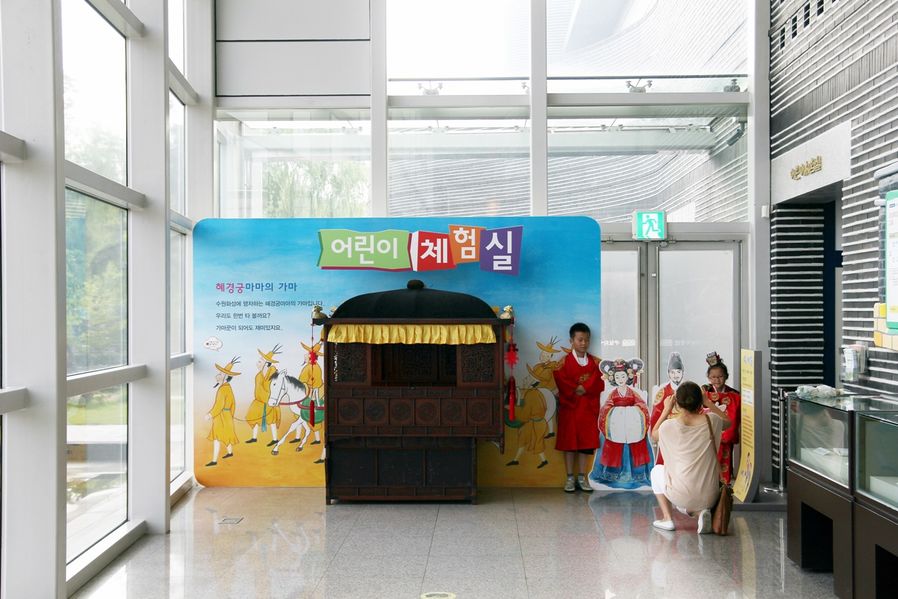
At the entrance on the first floor, there's a center that kids would love to play in. You could try palanquin or take pictures of yourself in the King's or Queen's clothes. It's all free so you could enjoy as long as you want.
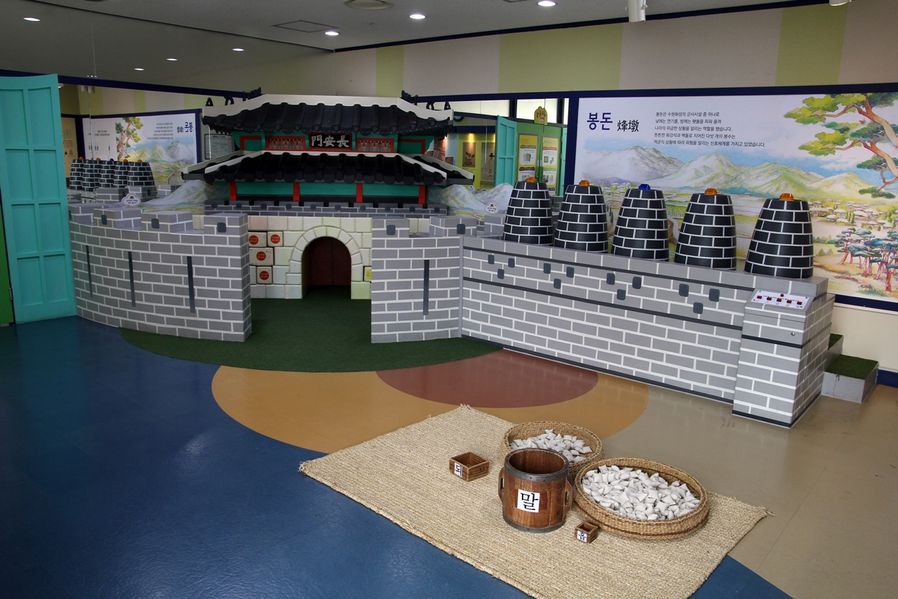
Inside the center, kids can make Suwon Hwaseong Fortress by themselves, and learn how to give a signal with a fire on Bongdon. They could also learn the units to measure the amount in old times like Mal, Doe and Hop. Even when I was a kid, they used to sell grains based on those units and Soju was sold like in 2 Hops or 4 Hops. FYI, one bottle of soju today is about 2 Hops(360ml).
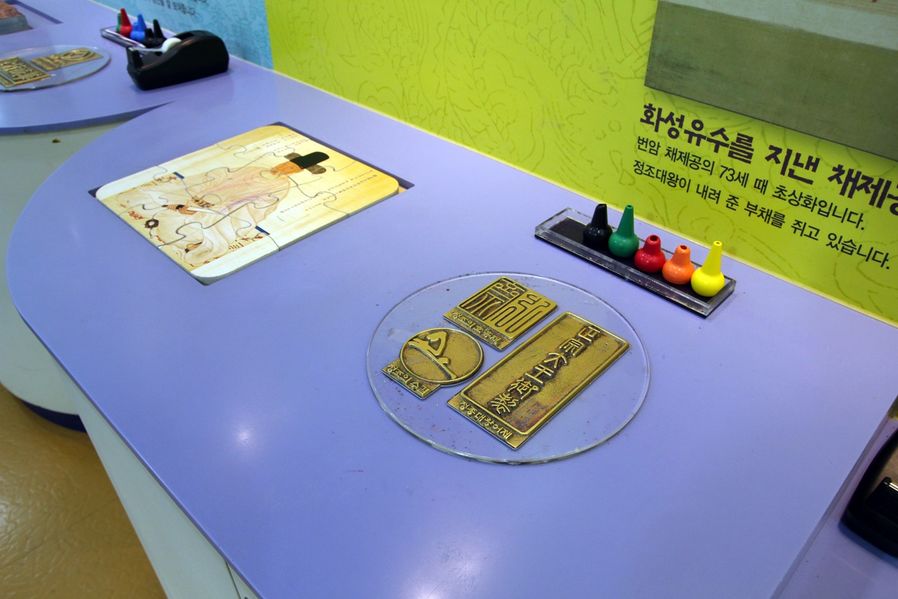
In one corner, you could build a block of portrait of the first vice-premier Chae Je-gong or take a rubbing of different things.
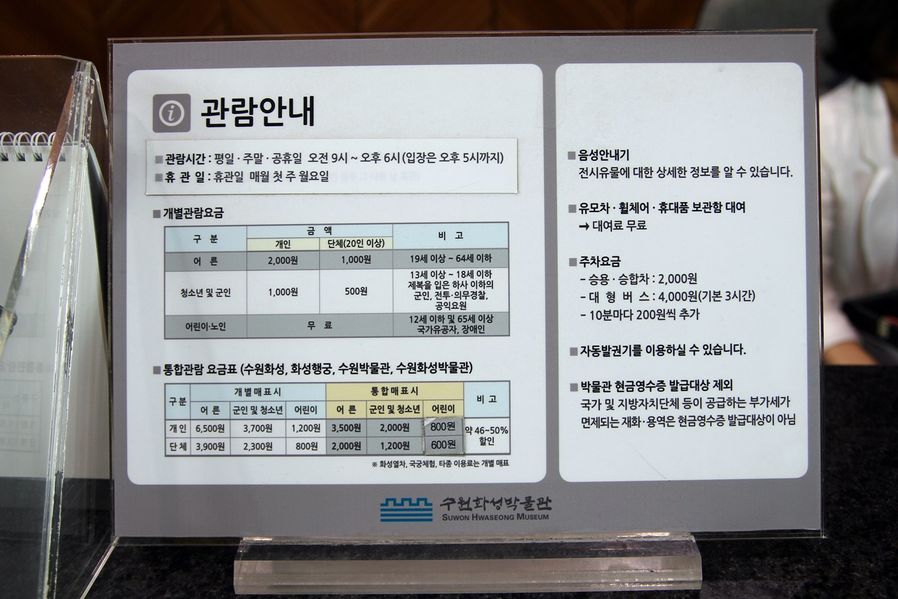
You could check the fees and guide informations on Suwon Hwaseong Museum in the picture above. If you're going to pay for your tour, it's much cheaper to buy United Ticket. Just keep that in mind.
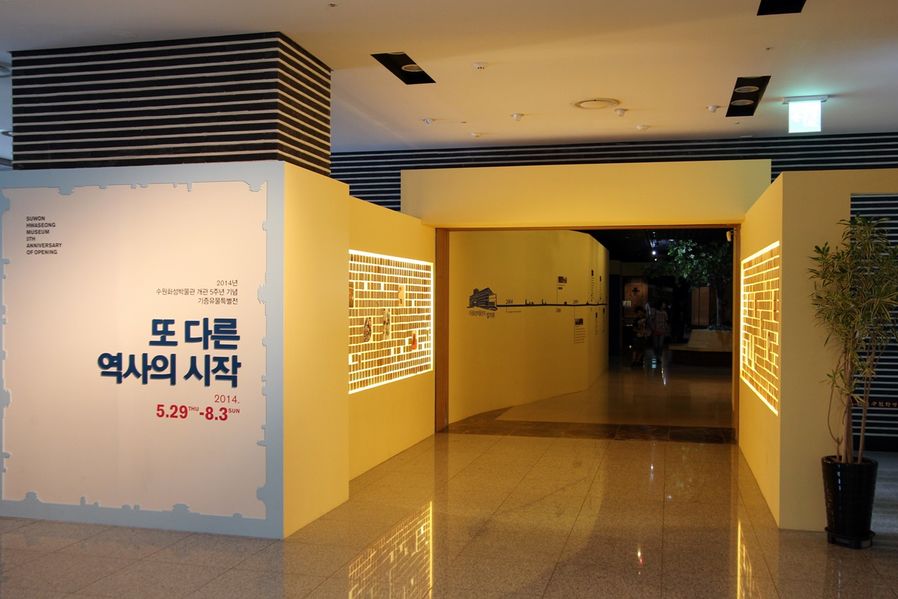
Anyways, I paid 2,000 for adult. There's always a special exhibition on the first floor with new theme every few months. In April, they opened a photo exhibition of Suwon Hwaseong Fortress during Joseon Dynasty and Japanese colonial period, but now, diverse relics donated to Suwon-si were displayed to commemorate 5th year of the exhibition.
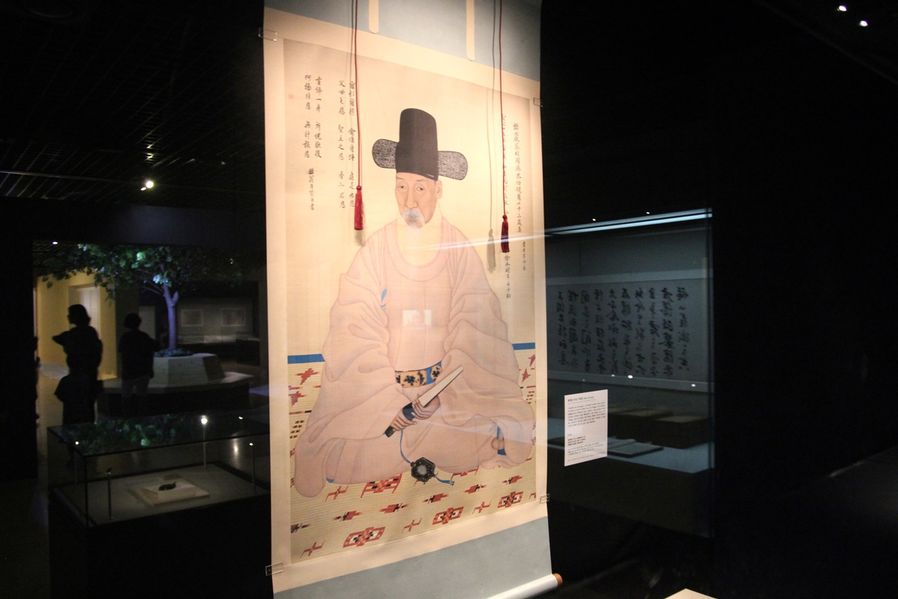
Firstly, I'm going to show you Chae Je-gong Portrait[蔡濟恭肖像一括-時服本; Chae Je-gong Chosang Ilgwal-Sibokbon]. I'm going to save my breath on other relics but not this one. I bet you've seen this photo many times. It's the portrait of Chae Je-gong who was up for Tang-pyeong Policy of the King Jeongjo in the late Joseon Dynasty which was highly appraised by Oh Ju-seok on his book 'Special Lectures on Korean Beauty' who is dead now, and this is also designated as a treasure number 1477-1. On the portrait, 73 years old Chae Je-gong is sitting on a figured matting with a folding fan and a scent bag in light pink official uniform with hair ring.
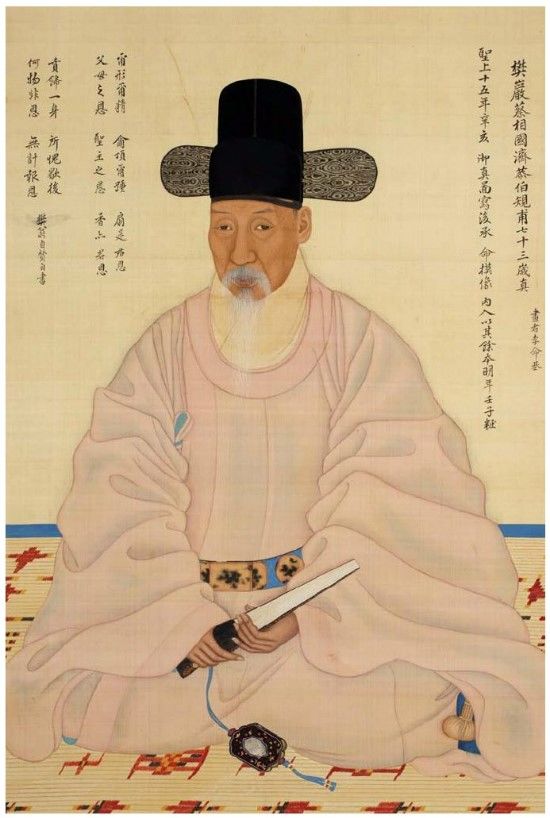
Okay, let's take a closer look. Korean traditional portraits do not beautify people. It's characterized by natural description in detail, even the age spots or scars on face, and this man is cross-eyed in this painting. Plus, the hand is expressed uniquely as well for a portrait in Joseon Dynasty, which is to show the folding fan and scent bag that the King Jeongjo bestowed on him.
In the right upper corner, '聖上十五年辛亥(1791) 御眞圖寫後承命摸像內入以其餘本明年壬子(1792) 粧' is written, and below that, it says 畵者(Hwaja - painter) is the best portrait painter in Joseon Dynasty, 李命基(Lee Myeong-gi). In the left upper corner, Chae Je-gong left a note himself and it says…
「Your look and your spirit is grace from your parents, everything that covers you from head to toe is grace from your King. The fan is grace from your King, the scent bag is also grace from your King, and there's nothing on or wrap your body that is not grace from your King. Yet I am shameful that I have no way to repay his kindness even after I die.」
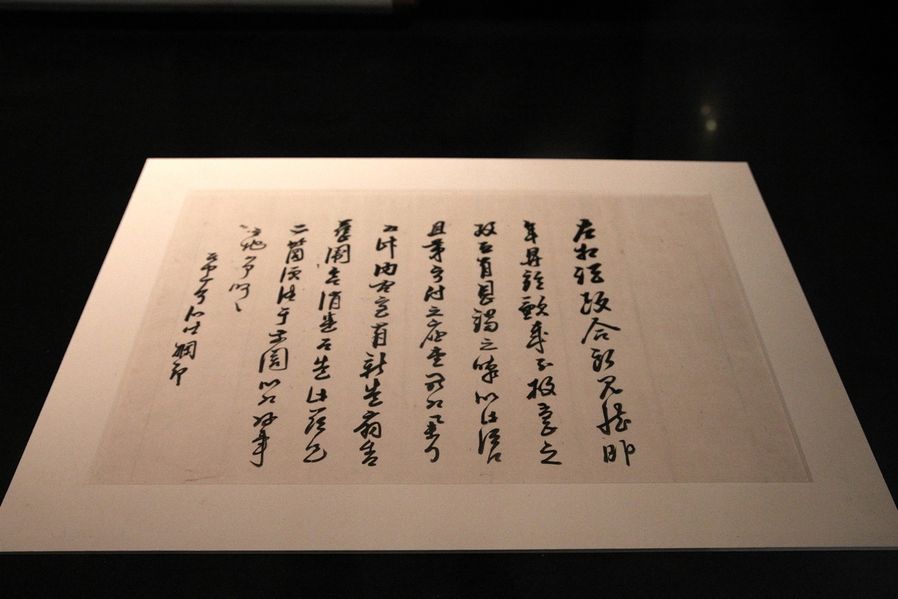
「Jwauijeong(the first vice-premier)'s words are consistent with mine completely. However, last year is unlike the year of bad harvest so I am worried that people might lament over absence of grace in political affairs to cope with urgent situations. I will make the Court to take care of it from now on. Just in time, the Palace made a new folding fan and my mother(Hyegyeonggung Hong) was told that it was made to pass the time. So I am sending two of them enclosed in the package so how about giving them to the former Jwauijeong to make everything look good? Haha. One of them seems to have a painting of a person sitting on handrails.」
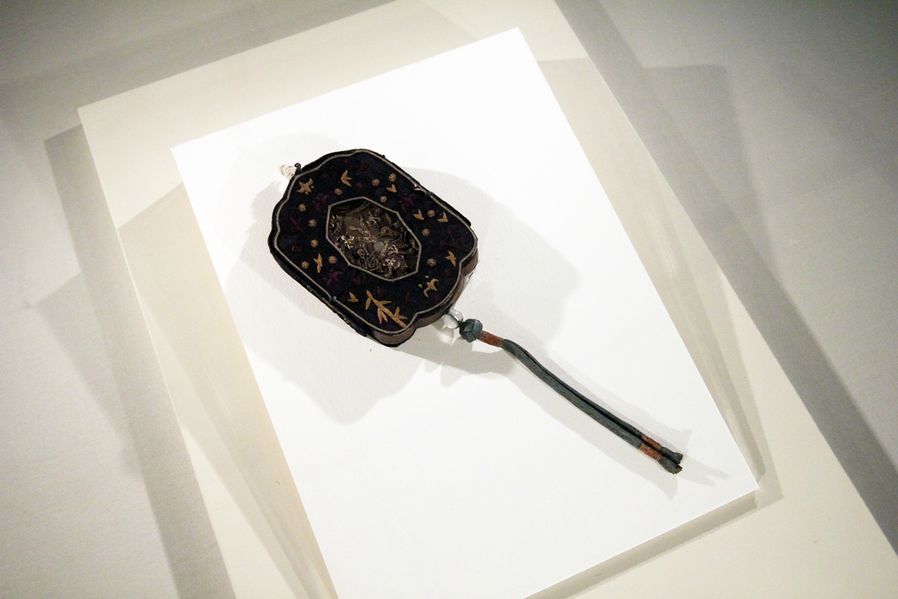
Other than that, there are so many relics donated so if you have a chance, please take a look around.
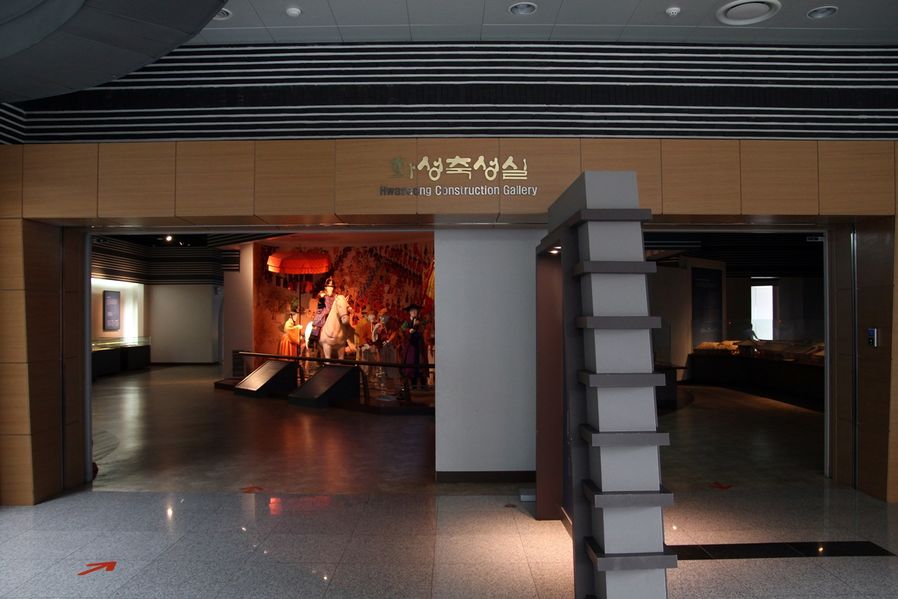
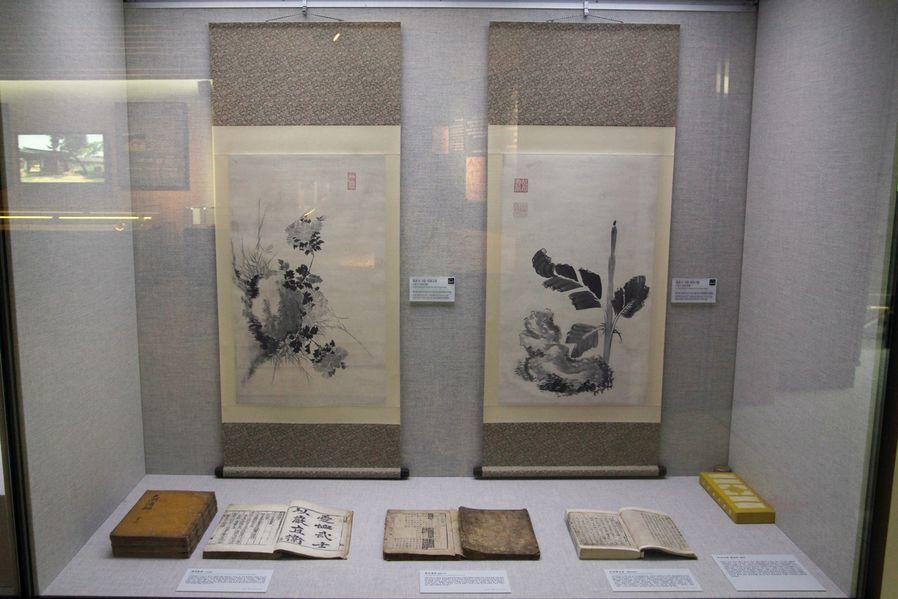
I could feel the spirit from the paintings that I saw at the entrance. Two of them were drawn by the King Jeongjo. The left one is chrysanthemum and the right one is plantain. I could imagine him sitting and drawing these paintings.
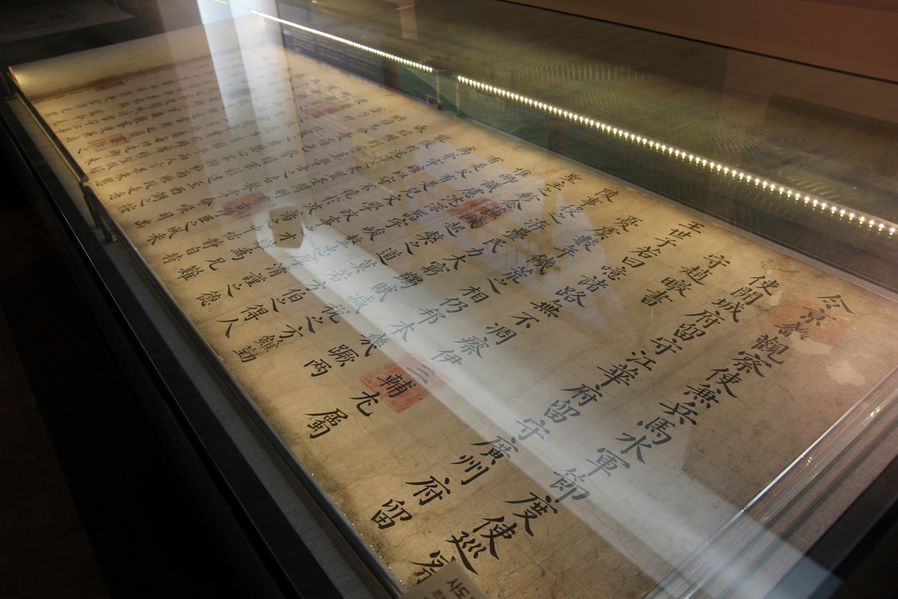
This document is Yeongseo (令書) of Prince Crown Sado, the tragic King. Yeongseo is literally a commanding document that the King gives to his retainers but it's more like a royal edict commanded by the King. It's because only the King who was managing the affairs of the state on behalf of the current King could command on Yeongseo. And this document open to public after 250 years kept in secret. The content goes like this
「On Dec. 28th, Geonryung 22nd year(1757), I highly praise the contributions of Jo Don(趙暾) to the relief of the poor as a Gyeonggi governor, ByeongmaSugunJeoldosa(official position designated to manage naval forces) and Sunchalsa(military leader). And the Crown Prince Sado also appreciates Jo Don's character by saying “when the people are poor and in urgent need, he reduced the burden of taxes, and I must say he is royal, honest and diligent.” Then he asked Jo Don to try harder to comfort his people as Gwanchalsa.」
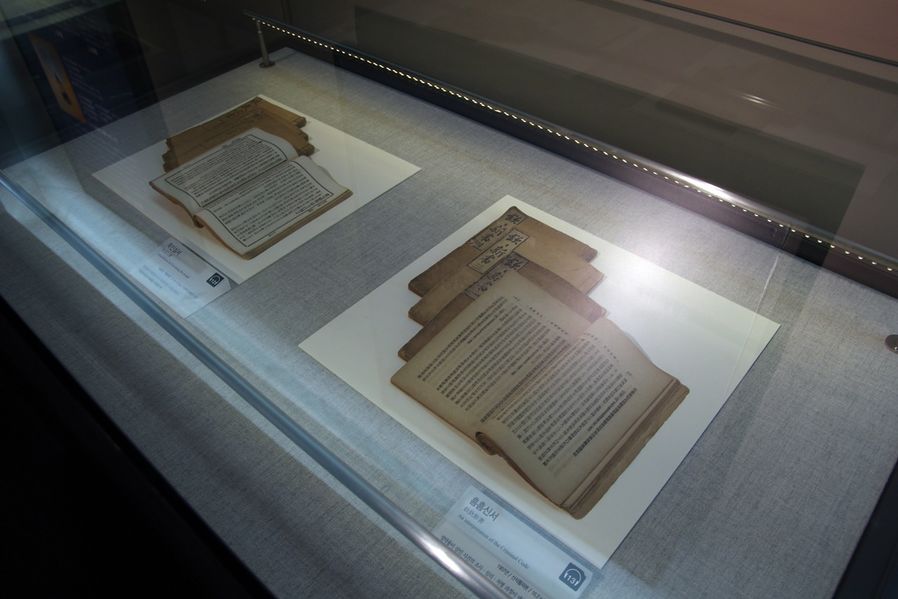
I could see all the relics that I read on the book here. The left one is Mokminsimseo(牧民心書; Admonition on Governing the People) and the right one is Heumheumsinseo(欽欽新書). Both of them were written by Jeong Yak-yong(丁若鏞), a Silhak scholar in the late Joseon Dynasty era. Mokminsimseo criticizes the tyranny of government officials and describes the rules that the towns and leaders should keep, and Heumheumsinseo is a criminal law book written to deplore the destruction of principles of life respect. I guess they're reference book for scientific investigation in Joseon Dynasty era.
This book is called Hwaseong Seongyeokuigwe(華城城役儀軌) enrolled as a Memory of the World. It records every detail from the beginning of building Suwon Hwaseong Fortress in 1794 until it was completed in 1796. Not only the blueprints of the castles and gates, the details about tools, bricks, soil trees used in the constructions, their prices, how they purchased those materials, wages of workers, prices at the time, who supervised, who were hands-on workers and who were master craftsmen, and the documents communicated between the King and the supervisors were there as well. In summary, they have every detail on building a new city, Suwon. Our ancestors' recording techniques sound spectacular, don't you agree?
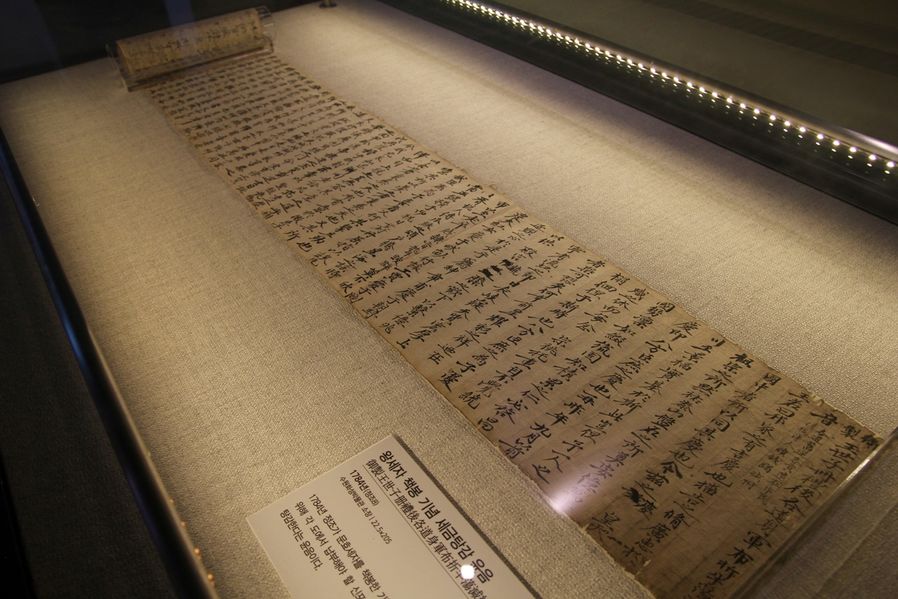
If you know the items displayed, it's funny but if you don't, it could be a boring tour. You can see as much as you know! This long document is interesting as well. This is Yuneum that the people would get a 50% discount in taxes that they had to pay to each Do in celebration of the installation of the Crown Princes Munhyo in 1784. Unfortunately, the Crown Prince Munhyo died from measles in Changdeokgung Palace after two years. Then his little brother became the King Sunjo. (※Yuneum(綸音) is a king's word in the Joseon Dynasty era.)
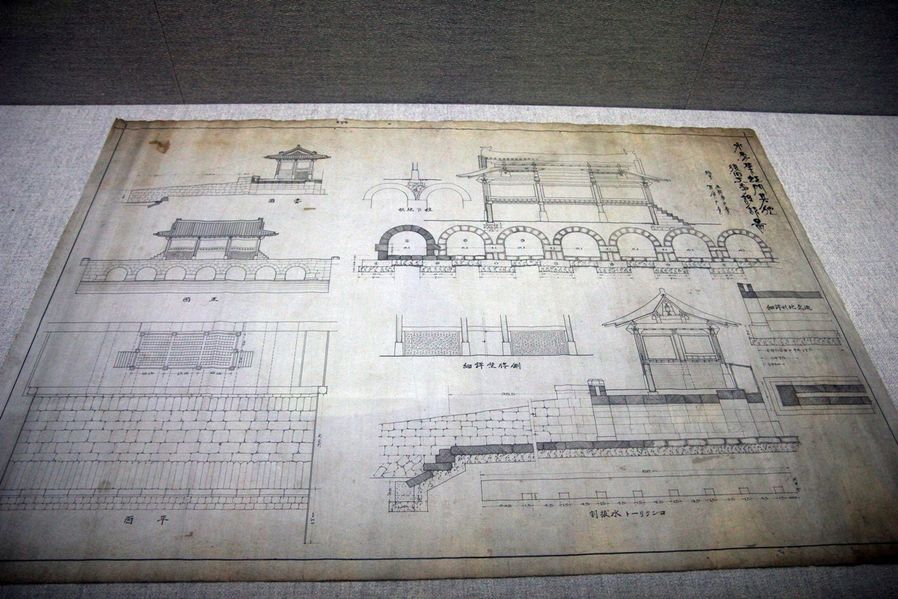
And the design drawings of Suwon Hwaseong Fortress were displayed as well. The picture above is a blueprint for reconstruction of Hwahongmun that I showed you before. This shows that even in those times, they planned for construction, not just start to work get it done.
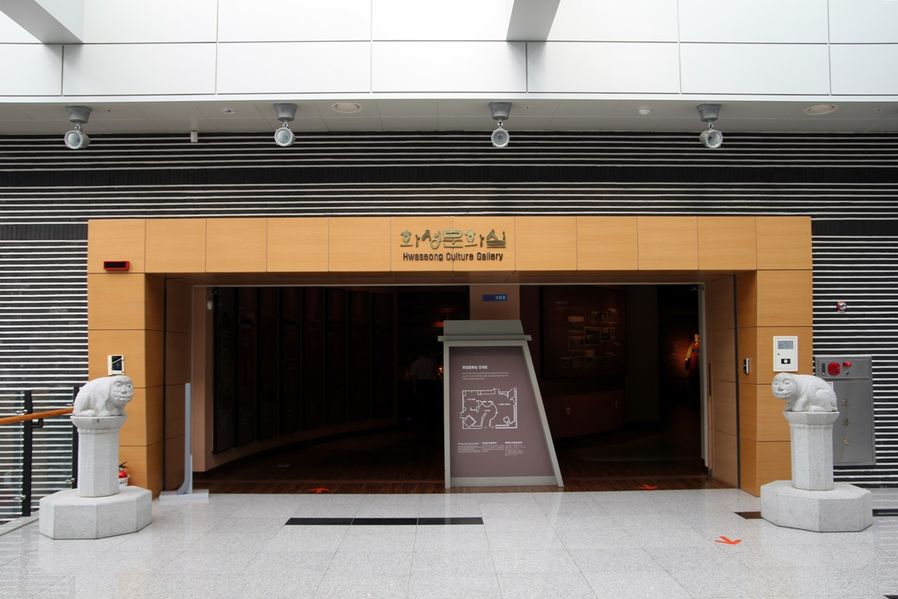
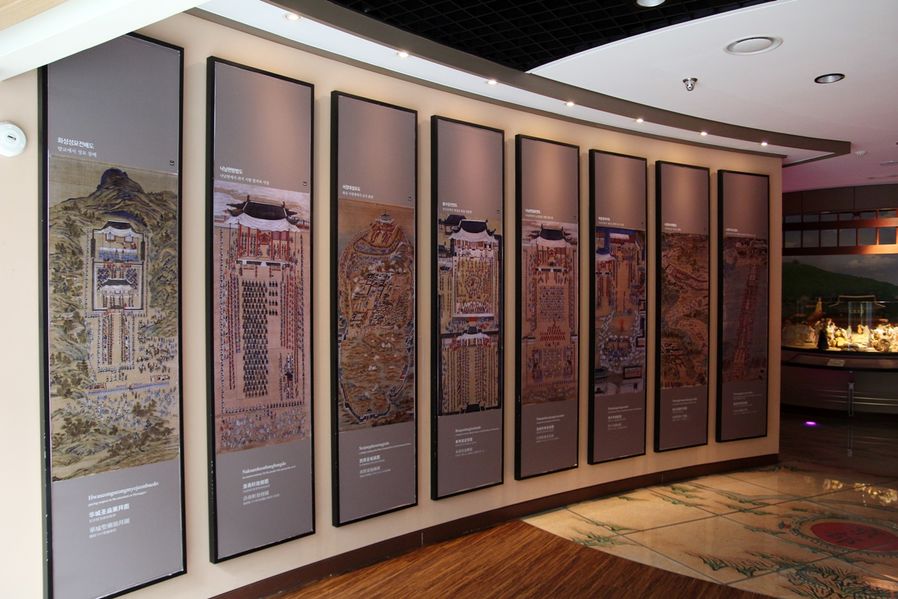
Hwaseong Cultures Room had relics that Chae Je-gong, the key character in military reform in the era of the King Jeongjo, donated and the relics related to the King Jeongjo's royal parade in 1795. You could feel the King Jeongjo's affection for his parents, Hyegyeonggung Hong and Crown Prince Sado,and see the weapons and martial arts of the military at Jangyongyeong established to strengthen royal authority.
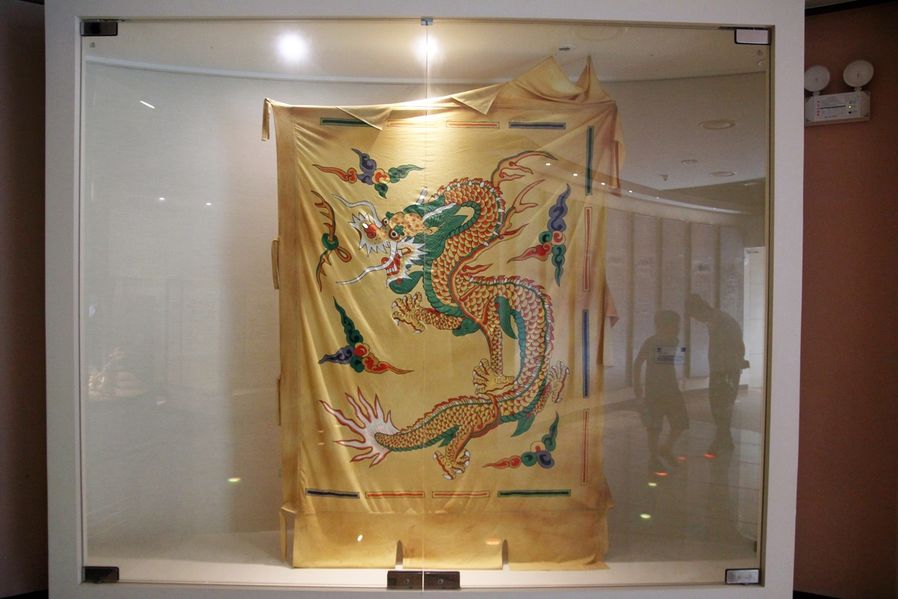
This is the flag that I've often seen on TV. It's a flag that alerts people that the King is marching in front of the parade. The dragon looks beautiful.
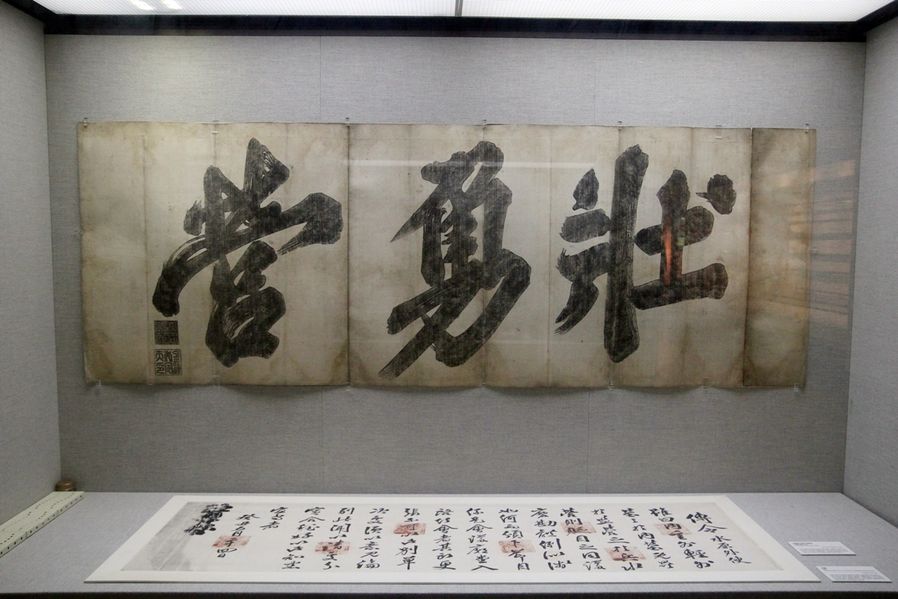
The King Jeongjo established Kyujanggak and Jangyongyeong in order to develop the literary and martial arts at the same time. The reason why the Jeongjo era had the extraordinarily developed cultures was because of these two institutions, but people are not aware of Jangyongyeong well. It's because it was disbanded after the death of the King Jeongjo and doesn't have anything left. This is the rubbing of framed picture of Jangyongyeong written by Kim Jong-soo.
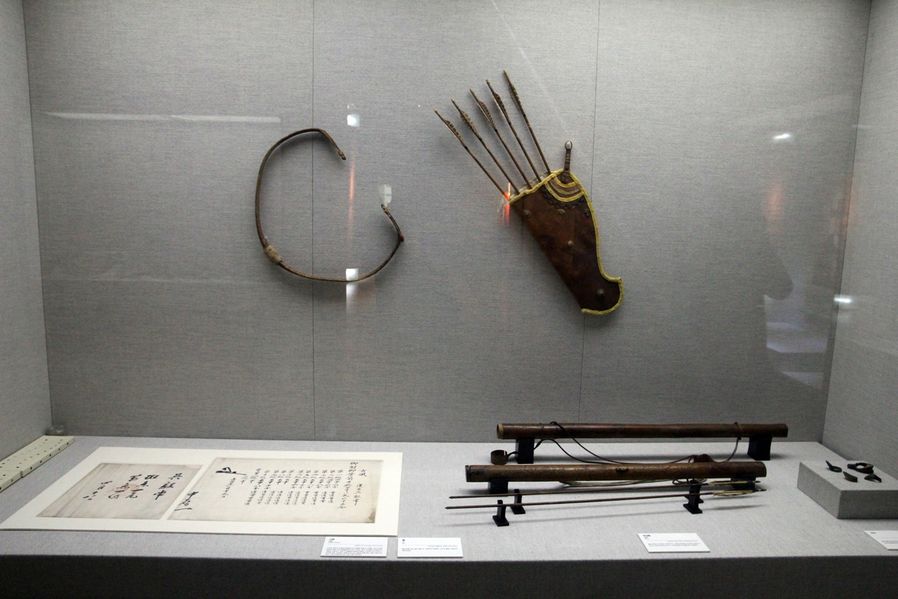
Bows, arrows and quivers used in Joseon Dynasty. Arrow looks like that before stringing a bow. And the document below was funny.
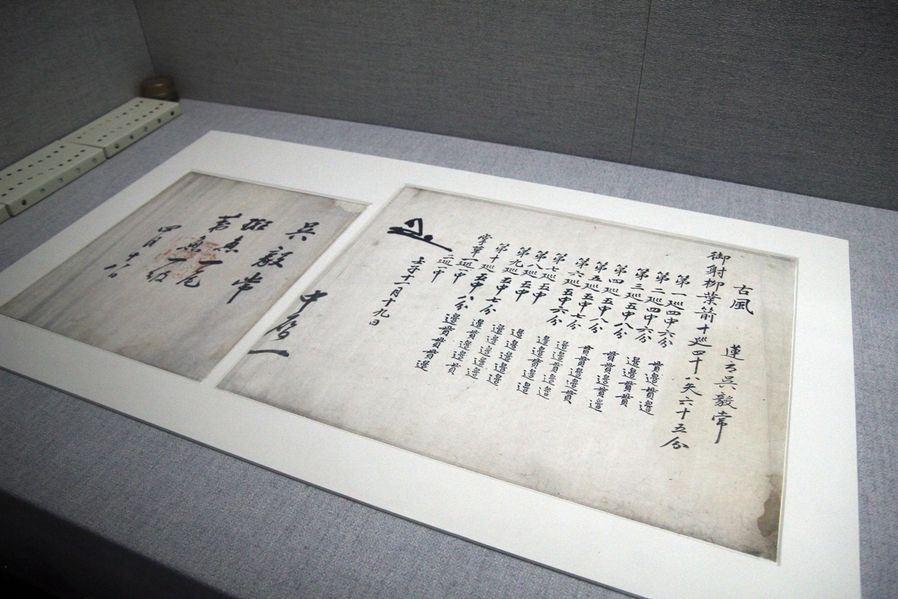
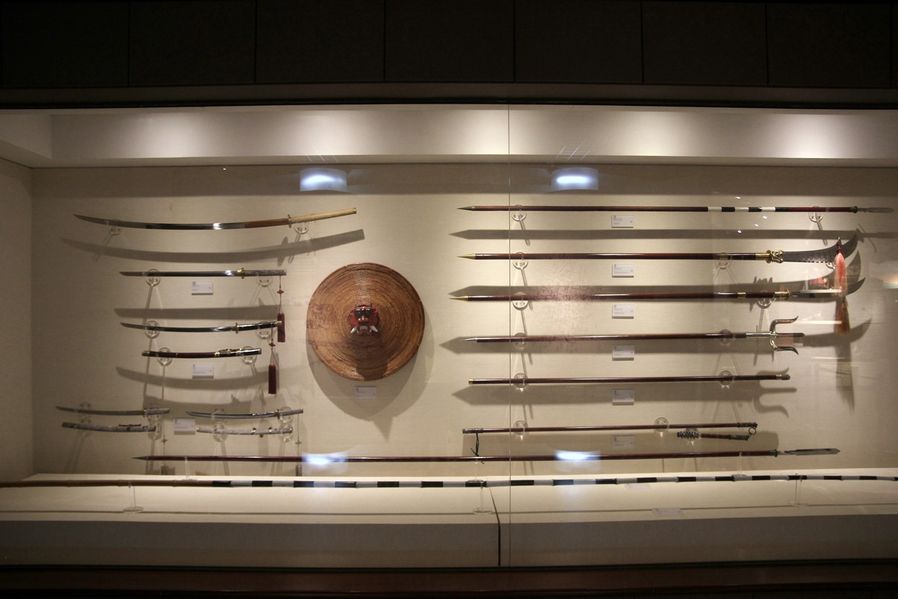
The weapons that I showed you from 24 martial arts show at Hwaseong Palace are all displayed here. The 24 martial arts performance actually used all of those weapons above. Amazing.
If you're at Suwon Hwaseong Fortress, you have to visit this museum. You'll see the process of building it by looking at it, history, culture and the king's thoughts. I strongly suggest you to visit here.
Address :Suwon Hwaseong Museum, 21, Changnyong-daero, Paldal-gu, Suwon, Gyeonggi-do (경기도 수원시 팔달구 창룡대로 21 수원화성박물관)
Telephone : 031-228-4205
'Suwon Chicken Alley' With Dozens of Chicken Shops 수원통닭골목
Suwon is a very attractive city. It always looks busy and complicated but if you look closer, you'll easily notice that you can't find more cheerful city than this one with lots to see and eat. So what I'm going to introduce you now is a must-visit street, Suwon Chicken Alley(Chicken Street).
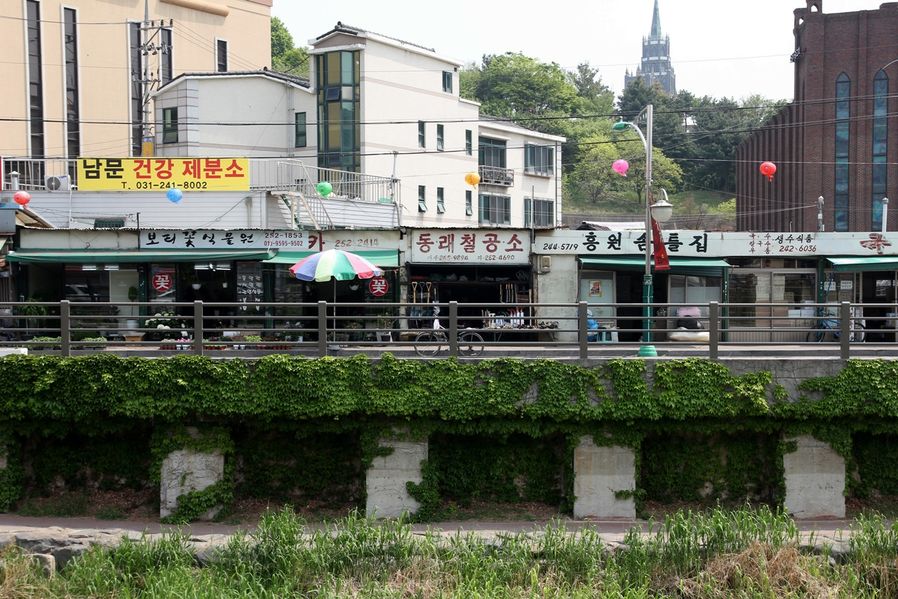
The city looked more relaxed after covered Suwoncheon was reconstructed. The water is clean that has fish in it which made me feel like I was in the countryside as a kid. Suwon-si, as an old city, still have kept old iron foundry alive which would've disappeared in cities. It sells shovel, pickaxe, and hoe.
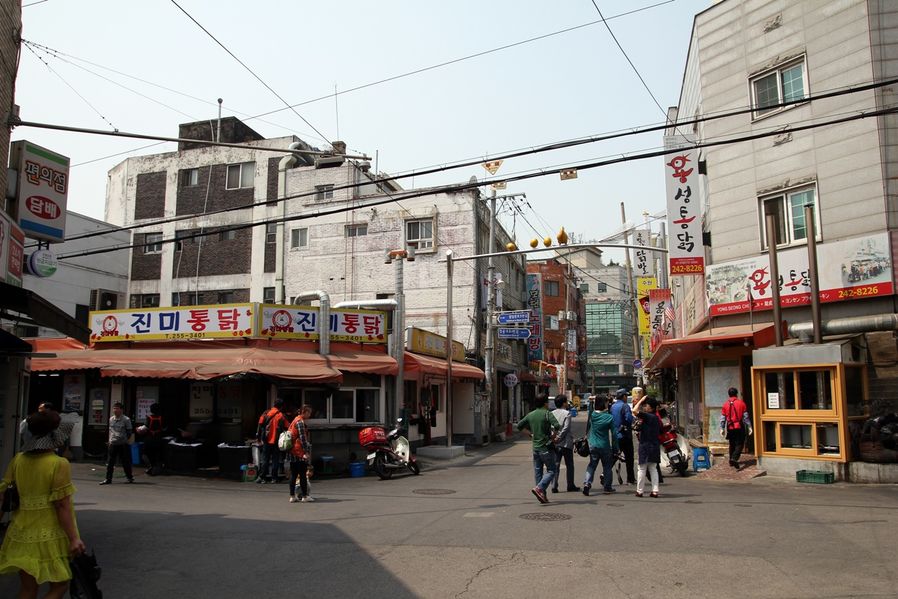
If you go up 100m along the river from Yeongdong Market or Jidong Market at Suwon Paldalmun, you'll see chicken shops on the left. You don't have to look for them, you can just smell them. If you have a car, you could park it at the parking lot around Jidong Market/Motgol Market, and at night you are allowed to park anywhere this area so you could park on the street. I've been there hundreds of times but it's not difficult to find a parking spot.
In the picture, you could see the most famous chicken shops, Jinmi Tongdak(chicken) and Yongseong Tongdak. You might think that Tongdak is a word that old people would use especially in Korea who's into English so much. But you won't find any better and money-making chicken shop with this Tongdak sign than the ones on this alley.
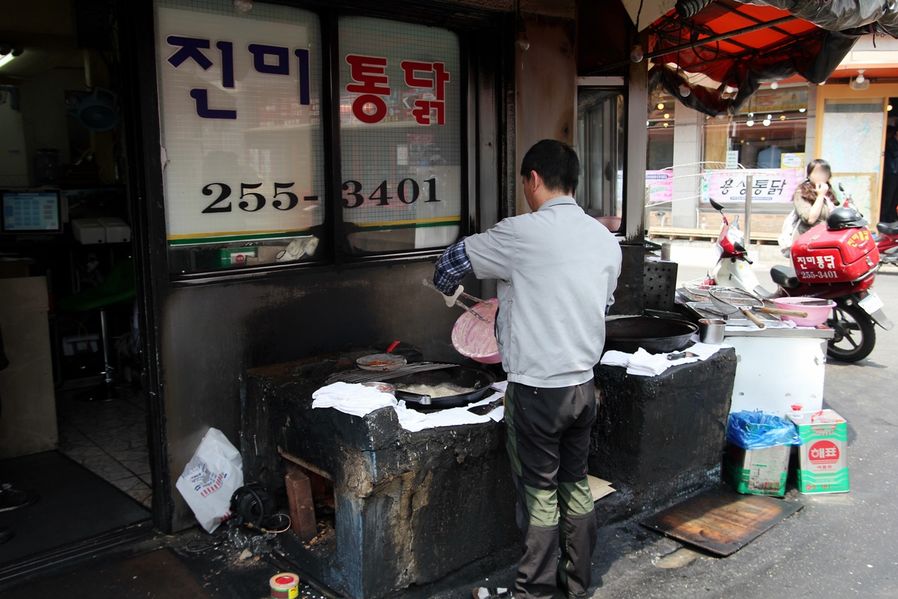
This is Jinmi Tongdak. I saw a few big iron pots outside that are seemingly a few decades old and they look so busy frying chicken. The prices were almost the same and they also deliver chickens if it's a close distance. I'm going to tell you the price when I introduce you Maehyang Tongdak shop…
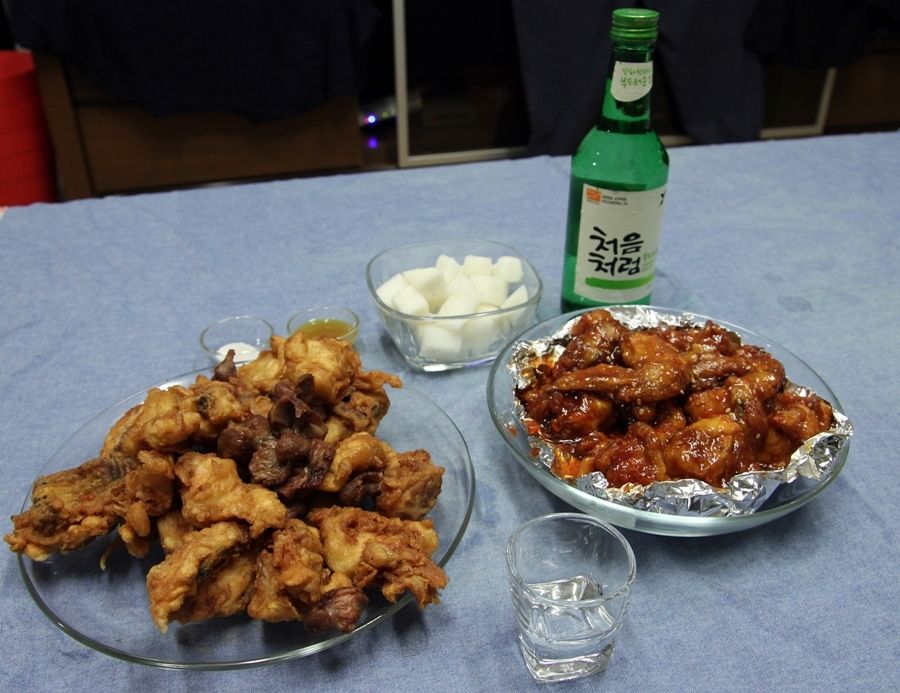
This is the one I bought at Jinmi Tongdak when I visited there before. I wanted to show you as many as I can so I had to dig up old photos. Jinmi Tongdak and Yongseong Tondak dip chicken in batter following the trend. So they tasted almost the same as anywhere. But the chicken is bigger and more delicious than the ones at franchise shops.
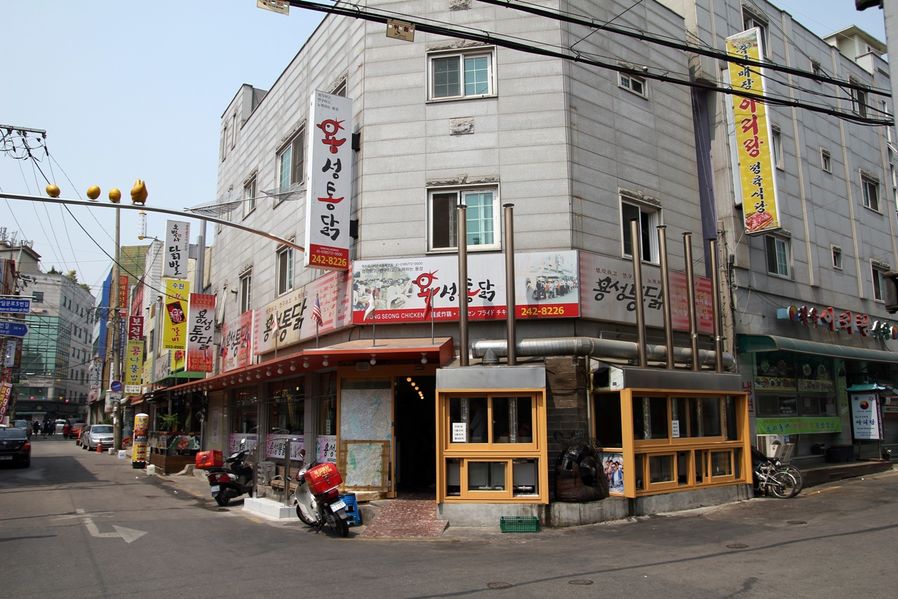
Now, let's take a look at Yongseong Tongdak.
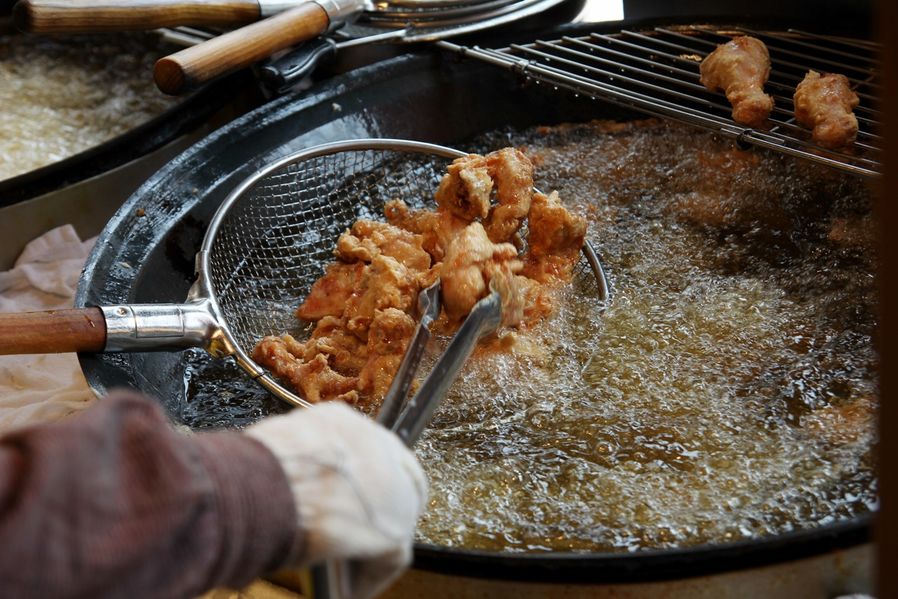
Unlike Jinmi Tongdak, Yongseong Tongdak was frying chickens in a cleaner environment. The oil looks fresh, doesn't it?
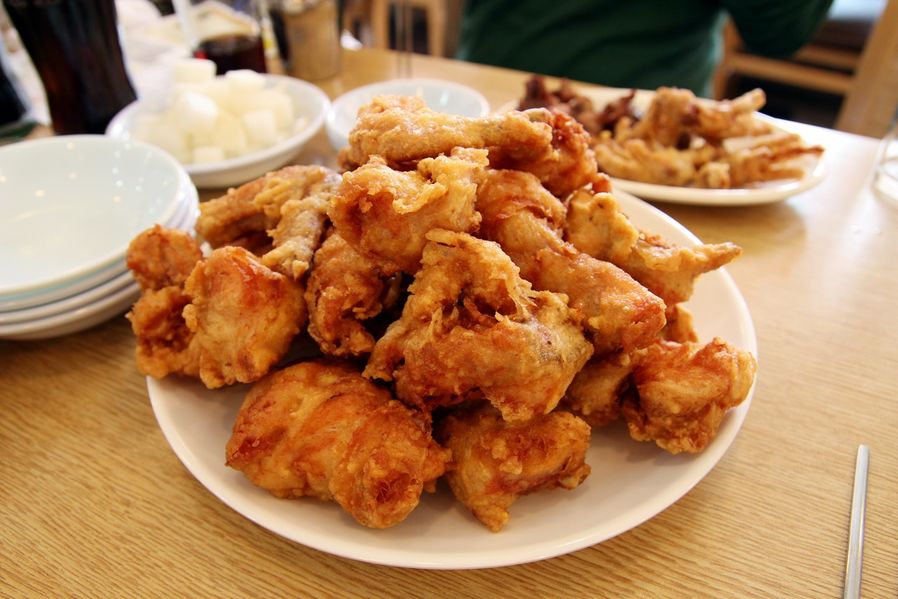
The chicken at Jinmi was wet and chewy but Yongseong's chicken had crispy batter. They must use the same quality chickens but the batter was different.
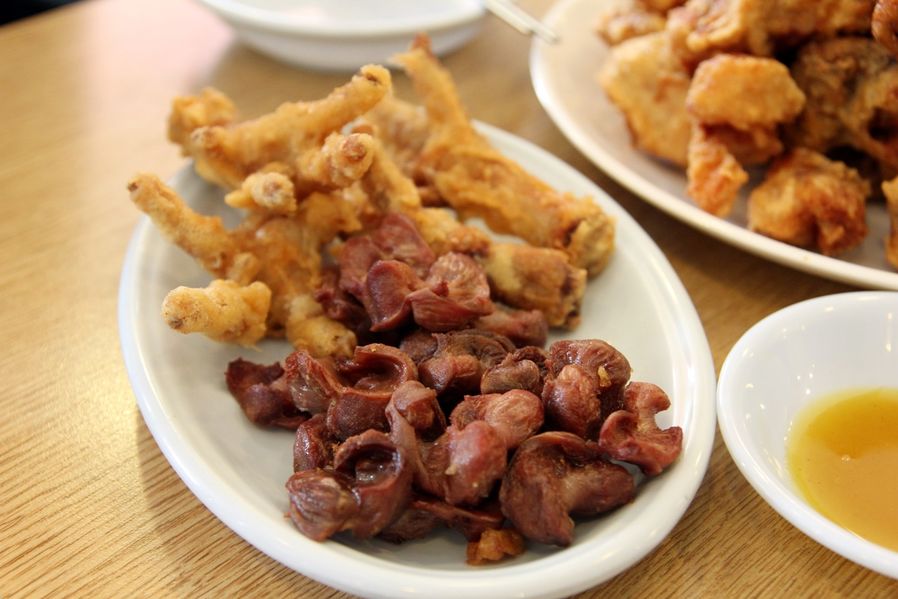
Plus, Jinmi gave us Ddongjib(large intestines) for free but Yongseong gave us Ddongjib and a dish of chicken feet for free. I should've been there in the evening, not afternoon. With this kind of appetisers, I could've drank 100 bottles of soju.
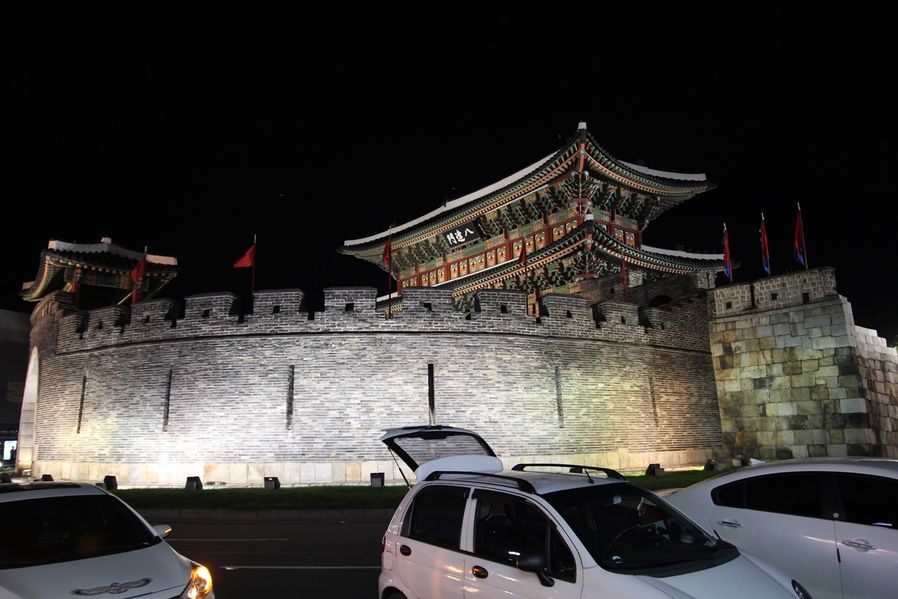
So in order to one bottle of soju, I went back there at night! I could get to the chicken street in 5 minutes past Paldalmun(Nammum) on foot.
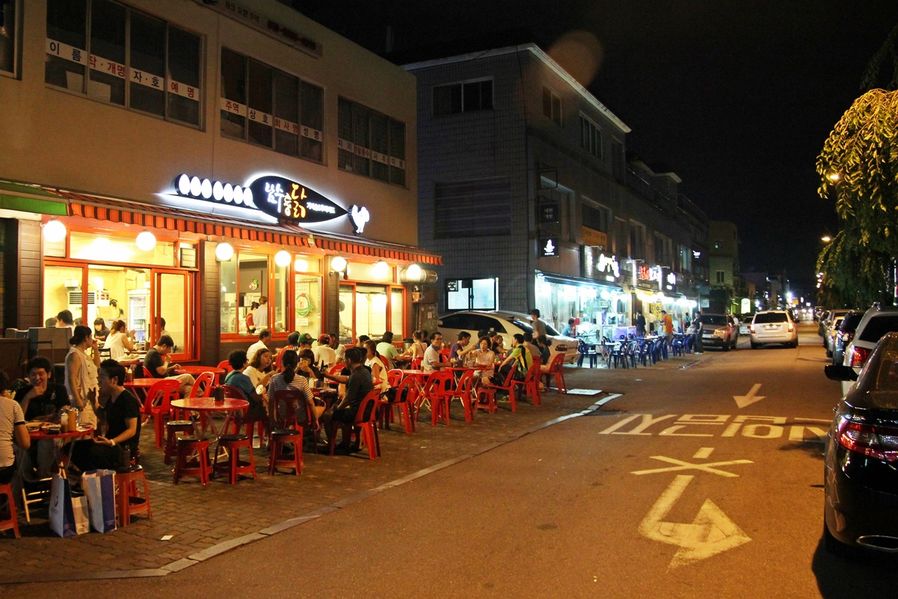
As it got dark, the street became more cheerful. This time, I went to Maehyang Tongdak at the end of the street along Suwoncheon.
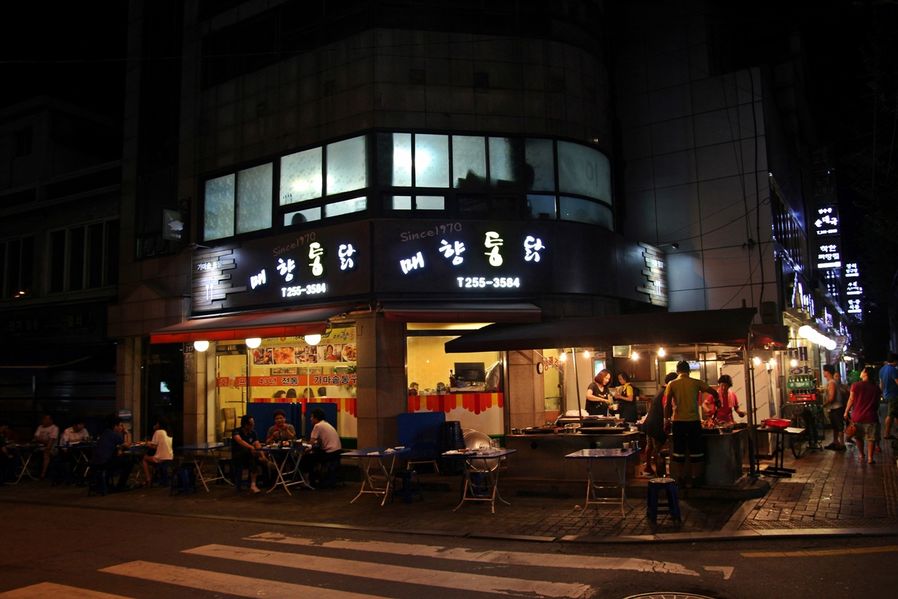
Maehyang Tongdak is right across the Suwon Hwaseong Museum. If you're following my travel course, you don't have to look for this chicken shop, you can just cross the street from Suwon Hwaseong Museum.
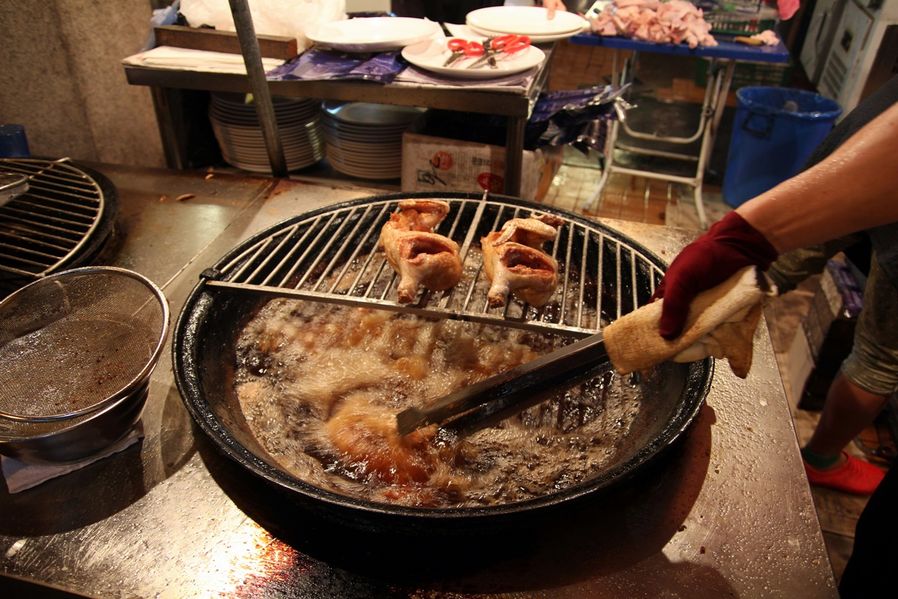
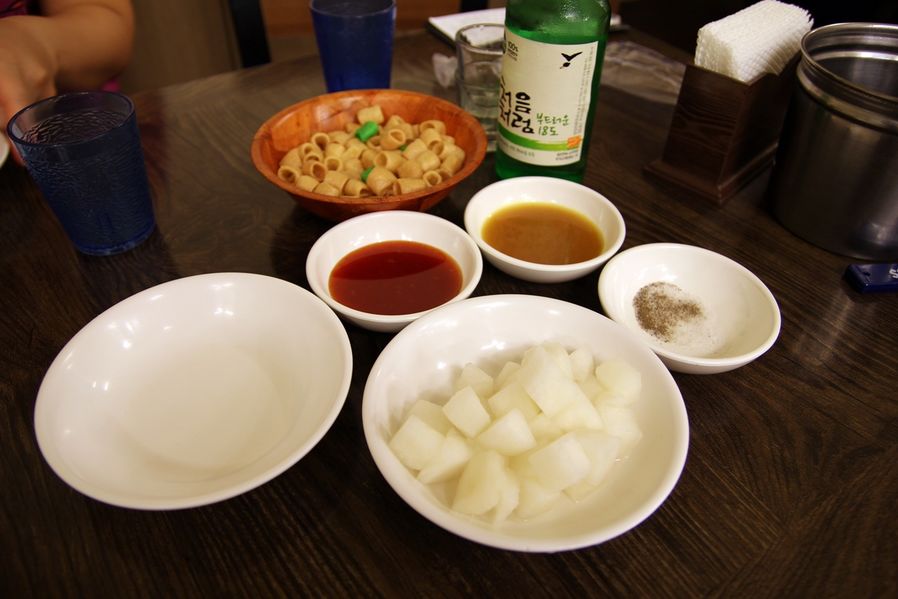
We ordered one chicken and waited.
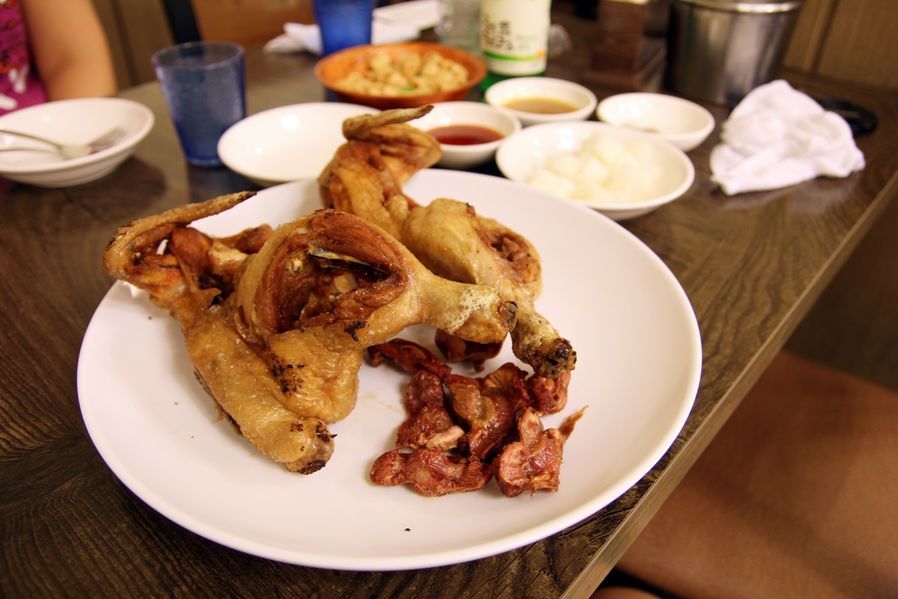
Tada~ one iron pot chicken showed up. It didn't have batter so it looked like something was missing.
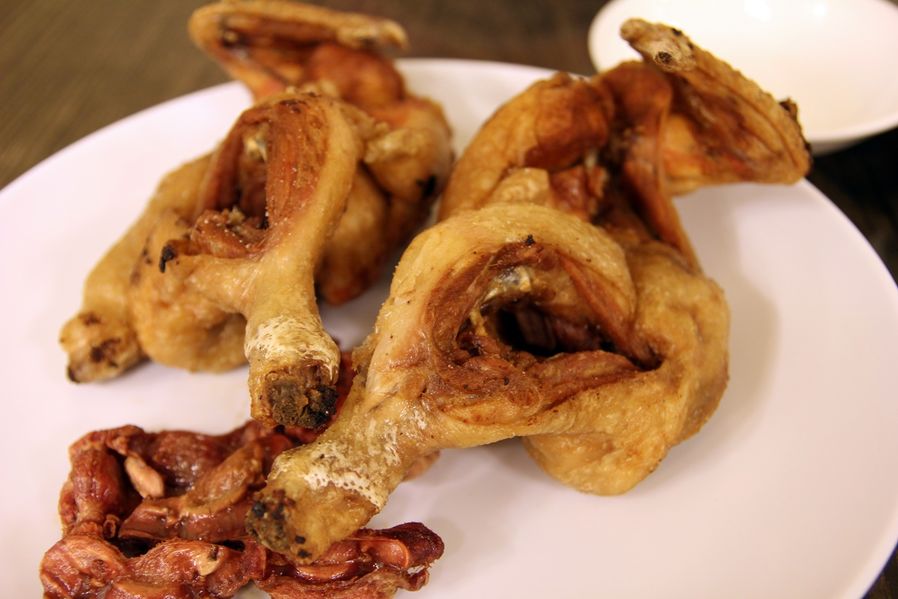
It's literally one chicken split into two. The chicken looked kinda small because it didn't have batter but the smell from it made my heart melt.
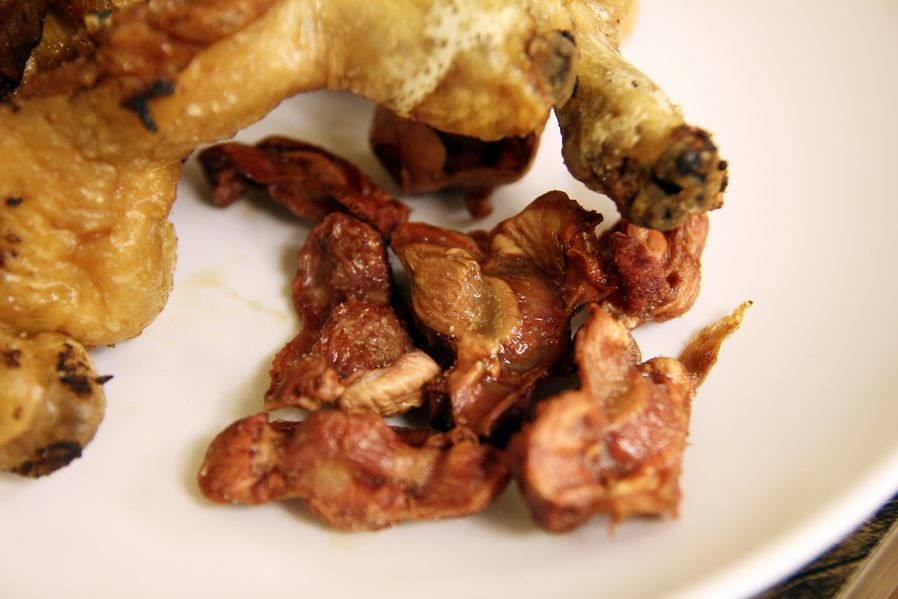
One chicken even with Ddongjib was fried and served as a whole.
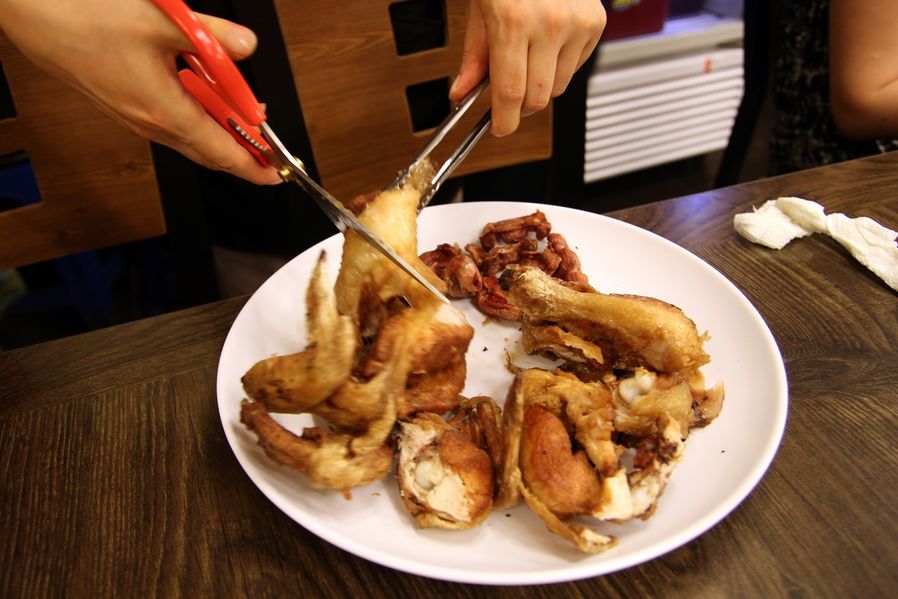
The owner cut the chicken into pieces for us.
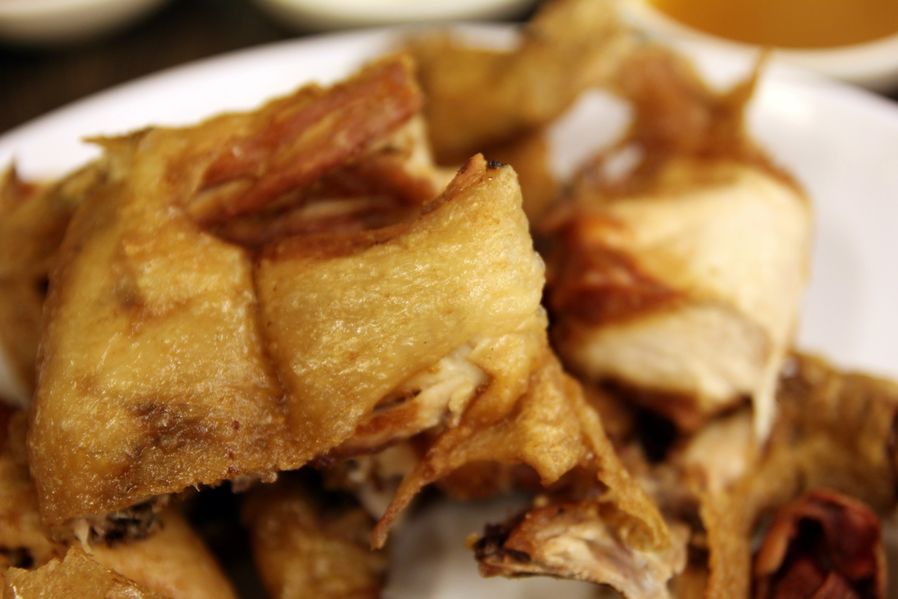
You wanna how it tasted? Mind-blowing! I didn't know what they did to it and it didn't even look like it's seasoned but the properly salted chicken was chewy and plain, just amazing.
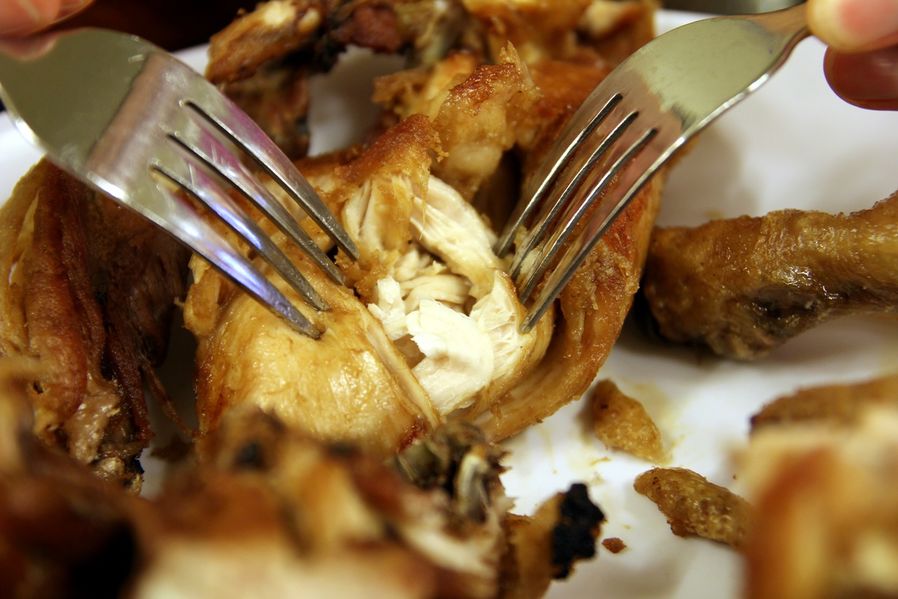
So we ordered this as I was on a diet, I figured it's better than chopped chickens for my diet. Plus, the taste was amazing. Perfect, isn't it? ^^*
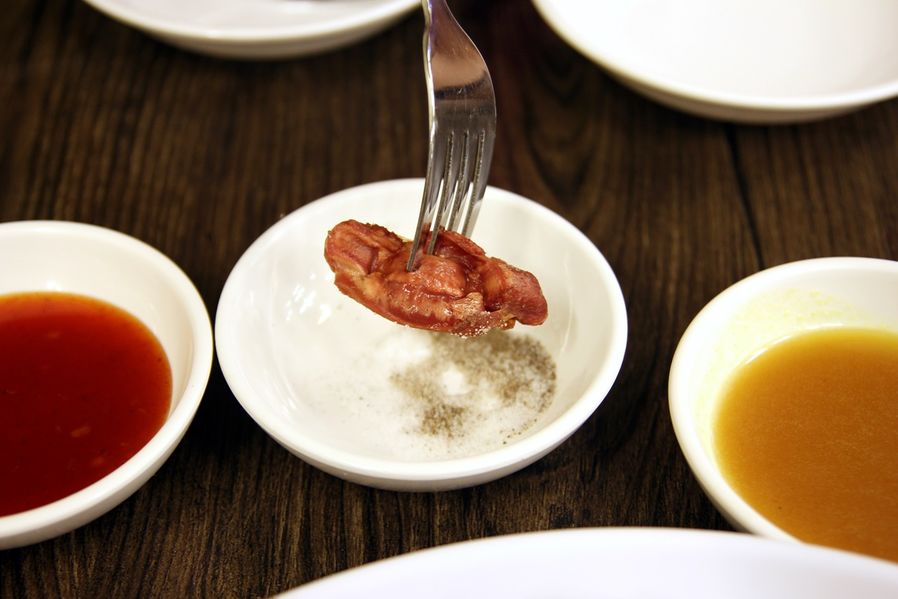
We couldn't leave the shop until we finished all including chewy fried Ddongjib. Well, you might ask what's so special about this chicken but if you wanna try clean tasted chicken, I strongly suggest you to try it here. Plus, spicy or strong sauces are also served with the chicken so you could also enjoy different flavours.
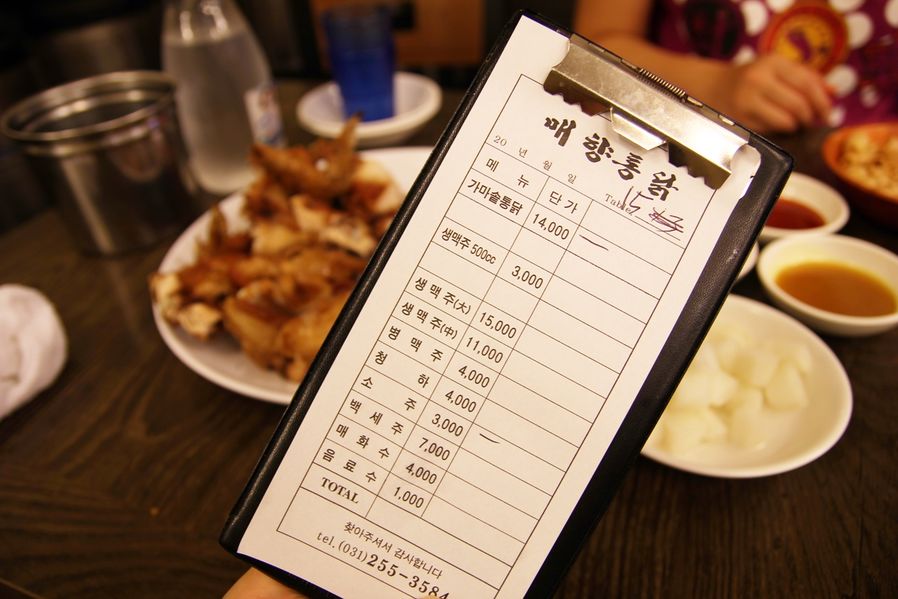
Since I tried all of most famous three chicken shops, I say Yongseong chicken had crispy batter. On the other hand, Jinmi Tongdak had chewy batter and it tastes good even after it gets cold. Lastly, Maehyang Tongdak doesn't use batter and chicken is not so oily, not so heavy to eat. They were all delicious.
Yongseong Chicken : 15, 800beon-gil, Jeongjo-ro, Paldal-gu, Suwon, Gyeonggi-do (경기도 수원시 팔달구 정조로800번길 15) / Telephone : 031-242-8226









